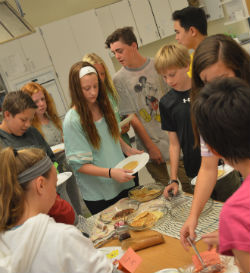If he’s ever lost in the woods with some pancakes, Mason Childers is confident he would be able to find sumac with which to make syrup. And the Central Middle School eighth-grader is in good company. He and others in the school’s “Natural Expressions” class are becoming well versed in what goes on — and grows — in the woods outside the building.
“She (teacher Lea Sevigny) told us what’s edible and what’s not, what poison ivy looks like,” Mason said as he flipped pancakes in the classroom’s kitchen with classmate Zach Zylstra. “It’s just a fun experience. I love it.”
During the semester-long elective, Sevigny introduces students to the great outdoors via bird-watching; berry, wildflower and invasive plant picking; and conservation.
So far this school year, besides making syrup and jellies, the class ran a booth at Ada’s Roselle Park with community partners Ada Township Parks & Recreation, Groundswell and LGROW (Lower Grand River Organization of Watersheds). Additionally, they have worked to eradicate invasive plant species on the school’s campus.

Real-life Experiences for Real-Life Situations
Sevigny described Natural Expressions as a “place-based communications class.”
“The goal is to go into the natural world and provide them with experiences that allow them to notice, record and share them,” she said. That could take the form of blog posts, sharing on environmental-based social media sites or reporting findings to organizations such as the Michigan Invasive Species Network.
The exploratory class, which integrates writing, science, math, communication and teamwork skills, came about after several district teachers were trained in place-based education through Groundswell, a local initiative aimed at getting teachers, students and businesses involved in environmental stewardship.
“But we had no opportunities for students to do (place-based learning) other than their core classes,” Sevigny said. “After we found Japanese knotweed on campus and reported it, one of my students told me she had noticed it grew around her family cabin. Now she has the skills to identify it, report it and maybe even take part in addressing it.”
CONNECT









